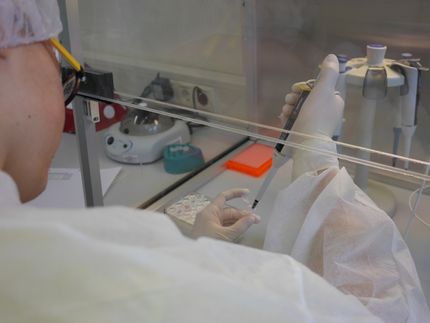Shining a light on DNA: a rapid, ultra-sensitive, PCR-free detection method
New light-powered DNA detection enables more accessible, affordable genetic analysis
PCR genetic analysis has been in the spotlight since COVID-19, but light is now further facilitating PCR-free methods.Osaka Metropolitan University scientists have developed a light-induced DNA detection technique, using heterogeneous probe particles, that enables ultra-sensitive and ultra-fast genetic analysis without the need for PCR amplification. This advancement is lighting the way for faster, more affordable, and precise genetic analysis across medicine, environmental science, and portable diagnostics.

Light accelerates DNA hybridization using gold nanoparticles and polystyrene microparticles as probes for PCR-free DNA detection.
Osaka Metropolitan University
As a means of analyzing changes in DNA, genetic testing — which is essential for diagnosing infectious diseases, detecting early-stage cancer, verifying food safety, and analyzing environmental DNA — has long relied on PCR (polymerase chain reaction) as the gold standard. Since the COVID-19 pandemic, the term “PCR” has become part of our common vocabulary. But as those of us who have experienced them know, PCR tests are neither cheap nor fast; they typically require centralized labs, bulky equipment, and specially trained personnel.
“Our light-induced method detects DNA without the need for PCR,” write Shuichi Toyouchi, a Project Lecturer, Prof. Shiho Tokonami, the Deputy Director, and Takuya Iida, the Director at Osaka Metropolitan University’s Research Institute for Light-induced Acceleration System (RILACS), as the lead authors of this study.
Unlike PCR, which amplifies DNA sequences by making millions of copies of target DNA for detection, this method directly detects DNA by concentrating it and enhancing specificity through strong optical forces and photothermal effect.
The team developed a system using heterogeneous probe particles, including gold nanoparticles and polystyrene microparticles. These probes are short, known DNA sequences designed to hybridize, or bind, with complementary sequences in the target DNA. This process, known as DNA hybridization, allows the matching strands to bind together, making the pairing detectable through fluorescence.
The researchers then irradiated, with laser light, the solution containing the target DNA and probe particles. When the particle size matches the laser wavelength, a phenomenon called Mie scattering occurs, generating optical forces that move the particles and accelerate DNA hybridization. The gold nanoparticles absorb laser light, creating localized heat, or photothermal effect, to further enhance the hybridization specificity.
“Using just about five minutes of laser light irradiation, our method demonstrated great potential for accurate mutation detection with a sensitivity one order of magnitude higher than that of digital PCR.,” Toyouchi, Tokonami, and Iida write.
By eliminating the need for PCR amplification, this method reduces costs, simplifies testing, and accelerates results, making genetic analysis more accessible in daily life applications — from healthcare and food safety to environmental conservation and personal health tracking.
“We aim to apply this PCR-free technology to high-sensitivity cancer diagnostics, quantum life science research, and even at-home or environmental DNA testing,” Iida said.
Original publication
Other news from the department science
Most read news
More news from our other portals
See the theme worlds for related content
Topic World PCR
This groundbreaking and highly versatile molecular technique of PCR allows us to amplify tiny amounts of genetic material on a large scale and analyze them in detail. Whether in medical diagnostics, forensic DNA analysis or research into genetic diseases - PCR is an indispensable tool that gives us deep insights into the world of DNA. Immerse yourself in the fascinating world of the polymerase chain reaction (PCR)!

Topic World PCR
This groundbreaking and highly versatile molecular technique of PCR allows us to amplify tiny amounts of genetic material on a large scale and analyze them in detail. Whether in medical diagnostics, forensic DNA analysis or research into genetic diseases - PCR is an indispensable tool that gives us deep insights into the world of DNA. Immerse yourself in the fascinating world of the polymerase chain reaction (PCR)!




















































